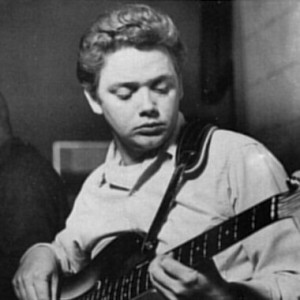-
Featured News
Shel Talmy: August 11, 1937 – November 14, 2024
 By Harvey Kubernik
The legendary and influential record producer Shel Talmy passed away in mid-November from a stroke at age 87.
Talmy arranged and produced the Kinks recordings 1964-1967, “My G
By Harvey Kubernik
The legendary and influential record producer Shel Talmy passed away in mid-November from a stroke at age 87.
Talmy arranged and produced the Kinks recordings 1964-1967, “My G -
Featured Articles
The Beatles: Their Hollywood and Los Angeles Connection
 By Harvey Kubernik
JUST RELEASED are two new installments of the Beatles’ recorded history, revised editions of two compilation albums often seen as the definitive introduction to their work.
Or
By Harvey Kubernik
JUST RELEASED are two new installments of the Beatles’ recorded history, revised editions of two compilation albums often seen as the definitive introduction to their work.
Or -
Donald “Duck” Dunn
By James Porter
“We had a band powerful enuff to turn goat piss into gasoline.”
That was one of Duck Dunn’s speaking roles in the movie The Blues Brothers. He was talking about the latter-day band that he played in with Steve Cropper, the Bar-Kays’ Willie Hall, Memphis Slim’s guitarist Matt “Guitar” Murphy, and, among others, singing actors John Belushi and Dan Aykroyd. But he could have been talking about the band that made him famous—Booker T & the MGs—and made twice as much sense.
Donald “Duck” Dunn, the lynchpin of numerous sessions during the first decade of Stax Records, died May 13, 2012 in his sleep in a hotel in Tokyo, aged 70.
Dunn wasn’t with Booker T & the MGs from the beginning—that’s Lewie Steinberg’s bass you hear on 1962’s “Green Onions”—but, with all due respect to Steinberg, Dunn was in the classic lineup from 1964-71 (and all reunions thereafter). During this period, not only did you hear Dunn providing serious bottom for “Hip-Hug-Her,” “Time Is Tight,” “Hang ‘Em High” and “Melting Pot,” but when the Stax hit machine really started to take off, you could hear him in full force on hits by Otis Redding, Carla Thomas, Eddie Floyd, Sam & Dave, Albert King, and various other luminaries at Soulsville USA (as the marquee outside Stax read). After 1969, the MGs started doing less and less sessions at the label as a younger crew called the Bar-Kays slowly took over. Dunn’s bass skills were legendary enough that he had no trouble picking up outside work, with Muddy Waters, Bob Dylan, Elvis Presley, Jerry Lee Lewis and others. While he didn’t quite have the high profile that his bandmates Booker T Jones and Steve Cropper did (both of whom also had reputations as producers, as well as issuing the occasional solo record), Dunn was still clearly in the mix.
While he kept playing up until the day he passed, he did get a second shot at fame with the Blues Brothers, a band-turned-movie assembled by John Belushi and Dan Aykroyd, who were then starring on the TV show Saturday Night Live. When their live version of “Soul Man” (originally recorded by Sam & Dave) became a hit in early ’79, Belushi could be heard during the fade shouting, “Steve Cropper & Duck Dunn!,” advertising the fact that two of the musicians that played on the original were also on the remake. Briefcase Full of Blues, the album that included it, was a huge enough seller that a Blues Brothers movie soon followed, with spoken bits from the entire band. The acting chops of the Blues Brothers Band varied, but Duck Dunn’s humorous lines never failed to steal the show. It was not hard to believe that this was the same man who once cracked “ask him if he’s got any fatback cacciatore” to his tablemates at a UK restaurant, when the Stax-Volt Revue toured there in 1967.
Born in Memphis, Dunn grew up in the same housing project and attended the same high school (Messick) as guitarist Steve Cropper. Realizing that he’d never be as good as Cropper, Dunn switched to bass, playing in a band called the Royal Spades while still in their teens. The two were reunited when Dunn joined the MGs in 1964. From then on Stax would go on to be the preeminent influence in 1960s soul, right alongside Motown. Duck Dunn’s basslines defined Stax as much as the late James Jamerson’s did Motown’s. Personally, I’ve always wondered if the Stax and Motown studio cats ever met up and talked shop during their sixties heydays—did Holland-Dozier-Holland (from Motown) ever swap songwriting strategies with Hayes & Porter (from Stax)? I don’t know if Dunn and Jamerson ever talked bass-ology somewhere down the line, but maybe now, that just might happen…
